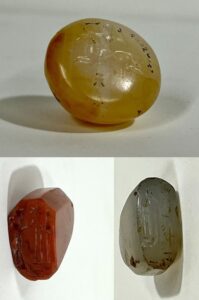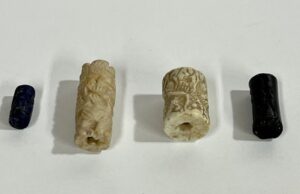He made the astonishing claims as he spoke to war veterans in Delaware and also told them a previously unheard story of how his uncle Frank Biden won a Purple Heart medal for his service during the Battle of the Bulge in 1944 during World War II.
There appeared to be some glaringly inaccurate key details in his tale - including there being no evidence of such an honor ever being awarded.
Biden went on to explain how his father urged him have his brother, Frank, be awarded the prestigious medal normally given to those wounded or killed while serving, on or after 5 April 1917, with the U.S. military.
The president claimed all of this happened when he had been elected as vice president, in 2008. However, his uncle Frank had passed away in 1999 and his own father died in 2002 making such a conversation impossible.
So we got him the Purple Heart. He had won it in the Battle of the Bulge. And I remember he came over to the house, and I came out, and he said, “Present it to him, okay?” We had the family there.
I said, “Uncle Frank, you won this. And I want to…” He said, “I don’t want the damn thing.” (Laughter.) No, I’m serious. He said, “I don’t want it.” I said, “What’s the matter, Uncle Frank? You earned it.” He said, “Yeah, but the others died. The others died. I lived. I don’t want it.”
Just like a generation — this generation in Vietnam — excuse me, in — in Iraq.
One of the last times I flew into Iraq, I went up in the cockpit.
And they fly me with what’s called a “Silver Bullet” when you fly the
President, and there’s a special container in the plane they stick you
in.
And I went up with a — I went up with a group, and I
was telling this to Beau’s father-in-law and my grade-school friend
who’s sitting right there — and he’s taping it all because he’s going to
use it against me here — (laughter) — Ronnie Olivere.
D.A. Bragg Announces Return of Antiquities Looted from the Iraqi Museum in 2003

Pictured: “Stamp Seals”
Manhattan District Attorney Alvin L. Bragg, Jr., announced the return of antiquities to the People of Iraq that were looted from the Iraq Museum in 2003. The pieces were smuggled into the United States, where they were purchased through various galleries and online auctions by a private collector between 2004-2009. The antiquities were returned during a repatriation ceremony attended by Iraq’s Charge D’Affaires Dr. Salwan Sinjar and U.S. Homeland Security Investigations (“HSI”) Assistant Special Agent in Charge Tom Acocella.
“These stunningly preserved artifacts are just a few of the many antiquities looted from the Iraq Museum. Thanks to the thoroughness of our investigators and prosecutors, we discovered that these pieces were for sale online without the proper documentation. We are pleased that they are finally returning home to the museum where they rightfully belong,” said District Attorney Bragg.
“I’m grateful for the work by the Manhattan District Attorney’s Office for its efforts to repatriate these precious, historic antiquities to Iraq,” said Dr.Salwan Sinjari, Iraqi Chargé d’Affairs to the United States. “These pieces belong to Iraq—and belong in Iraq—and now they will help the Iraqi people better understand and appreciate our own history and culture with this connection to the past. This is another example of the longstanding cooperation, friendship, and partnership between Iraq and United States.”
“Homeland Security Investigations is proud to stand with our partners from the Manhattan District Attorney’s Office and the Republic of Iraq to return these ancient cylinder and stamp seals. These items were looted by thieves taking advantage of the confusion of war to turn a profit with total disregard to their cultural value,” said Ivan J. Arvelo, Special Agent in Charge of Homeland Security Investigations in New York. “These artifacts date from as far back as 2700 B.C.E. and were a critical part of everyday life in the ancient world. Now, they will return to their rightful home.”
The pieces returned include four cylinder seals and three stamp seals dating to between the Mesopotamian (2700-2500 B.C.E.) and the Neo-Babylonian (612-539 B.C.E.) periods. These seals were an important part of daily life and are engraved with figurative scenes. The carved illustrations on these seven seals depict images of gods, human figures, animals, and other scenes of worship. Each unique seal served as a personal signature to guarantee authenticity of either an individual or a business, and appear today almost exactly as they would have looked to the ancient people who used them.
In March of 2021, one of the stamp seals was listed for sale in an online auction, leading this Office to begin an investigation into its origin and provenance. Our investigation revealed that the consignor of this stamp seal was in possession of six additional seals that were all purchased shortly after the looting of the Iraq Museum and lacked any documentation confirming that they had entered the art market prior to 2003.

Pictured: “Cylinder Seals”
The investigation was conducted by Assistant District Attorney Matthew Bogdanos, Chief of the Antiquities Trafficking Unit; Assistant District Attorney James Edwards-Lebair; Supervising Investigative Analyst Apsara Iyer, Investigative Analyst Giuditta Giardini; and Special Agent Bobby Fromkin of Homeland Security Investigations.
In 2022, the office has returned 892 antiquities, valued at over $104 million to 15 countries. Since its founding, the Antiquities Trafficking Unit has returned over 2,400 antiquities, valued at over $200 million, to 22 countries.
###
The United States Navy has named a next-generation helicopter assault ship the USS Fallujah, almost two decades after the western Iraqi city was the scene of bloody battles that killed hundreds of civilians.
[. . .]
The US-led coalition conducted a devastating bombing campaign before their second attack, forcing some 300,000 civilians to flee.
Between 30,000 and 40,000 civilians remained trapped in Fallujah during the assault, living through what the International Committee of the Red Cross (ICRC) described at the time as a “catastrophic” humanitarian situation.
The ICRC announced immediately after the battle that some 800 Iraqi civilians were killed in the fighting. It later accused the US of using white phosphorus as a weapon to defeat the militants.
To this day, babies born in Fallujah have suffered disproportionately high levels of birth defects, including congenital heart disease, gastroschisis (where the digestive system is found outside the baby's body), and Spina Bifida.
One of the most documented reasons for the birth defects has been the lingering impact of uranium in the local environment, a remnant of the US bombardment.
Fallujah is where, just a few weeks after the fall of Baghdad in 2003, soldiers of the 82nd Airborne Division opened fire on a crowd of civilian protesters and killed 17 of them; the U.S. military claimed that the first shots came from Iraqis, but there is no convincing evidence for that assertion and significant reporting to the contrary. Fallujah was a stronghold of the ousted dictator Saddam Hussein and for that reason, its residents fiercely opposed an unprovoked invasion that was, according to international law, flagrantly illegal.
Those killings were the prelude to a torrent of violence and destruction in 2004. The bloodshed that year included the deaths of more than 1,000 civilians; the point-blank murder of prisoners; and the torture of inmates at Abu Ghraib prison, just 20 miles away. Fallujah’s punishment even extended beyond the brutal era of its U.S. occupation; in years after, there has been a spike in cancers, birth defects, and miscarriages, apparently due to America’s use of munitions with depleted uranium.
Instead of apologizing for what was done, the U.S. is choosing to celebrate it: The Pentagon announced this week that a $2.4 billion warship will be named the USS Fallujah. The commandant of the Marine Corps, Gen. David Berger, made clear that the military has decided to double down on its fairy tale of Fallujah as an American triumph. “Under extraordinary odds, the Marines prevailed against a determined enemy who enjoyed all the advantages of defending an urban area,” he said in a press release about the naming. “The battle of Fallujah is, and will remain, imprinted in the minds of all Marines and serves as a reminder to our nation, and its foes, why our Marines call themselves the world’s finest.”
The announcement noted that more than 100 U.S. and allied soldiers died in Fallujah but said nothing about the far larger toll of Iraqi civilians killed, the flattening of swathes of the city through extensive bombings, the apparent war crimes by U.S. forces, the health impacts on civilians that continue to this day — and the inconvenient fact that U.S. forces were unable to keep their hold on Fallujah for very long. For the Pentagon, it’s as if none of it mattered, or it didn’t happen.











 A Modern Media Company
A Modern Media Company








